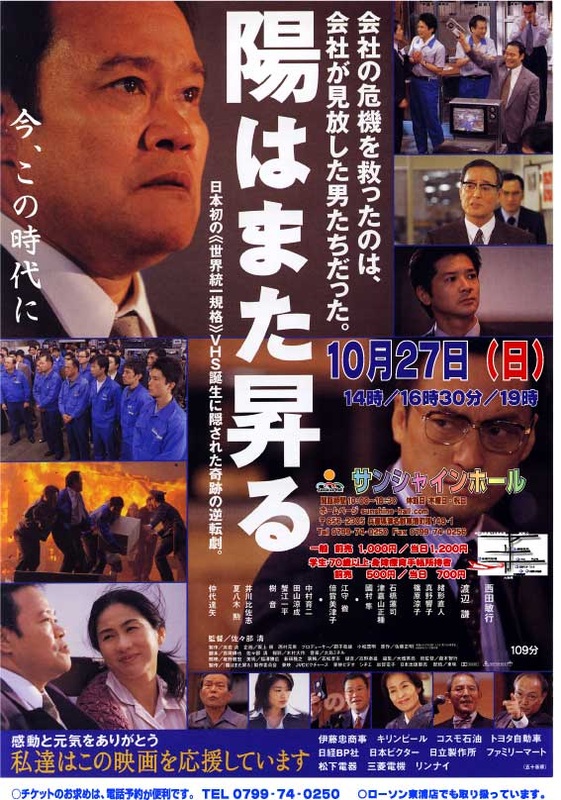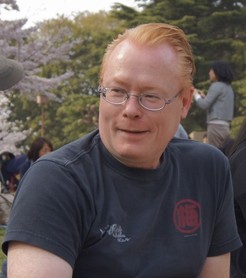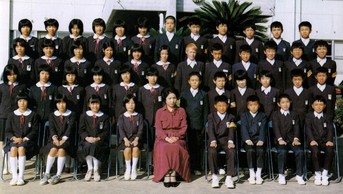|
The Sun Also Rises (陽はまた昇る), starring Ken Watanabe (Westerner's will know him from The Last Samurai and Inception) is a great movie showing Japanese Leadership & Innovation at its finest -- in this case concerning the development of the VHS tape standard and VHS Video Tape Recorder by Victor Japan (JVC).
0 Comments
In this ranging expert interview, Louis Carlet, Executive President of the Tozen Union (Tokyo General Union) discusses:
1. His background, how he came to Japan and later became involved in the organized labor movement. 2. What is a labor union, how do they work in Japan, what are the mechanics of a union and what are the benefits for members, the company, company management at society at large? 3. A brief comparison between US and Japanese Labor Unions. 4. The Mechanics of joining the Tozen Union and how to organize labor at your firm or company by starting a Local. 5. Japanese Labor Laws and protections that Unions have as well as the obligations that Management has to meet with and negotiate in good faith with the Union. 6. And much more! The Japan Expert Insights section of FirstPoint Japan is now live. In this section, we'll
explore and explode the myths and memes of what it really takes to do business and succeed in the Japanese market today. From innovation, diversity, recruiting, staff retention, business development, software internationalization and localization and more! FirstPoint Japan's Advisory Board member, Kim Pedersen, was just interviewed by Asia Biz's Howard Lim. This is a very fascinating interview as Kim is one of the few foreigners to have been educated in the Japanese public school system rather than shipping of to the English-language curriculum's found in the international schools.
A Comparison Between Japanese & Danish Work Environments & Its Influence On Work Life Balance, Part 3
By Kim Pedersen (Guest Blogger) Originally, roukan.com was created in an effort to contribute to the improvement of the Japanese working environment. The reason for this is that having worked for both Japanese and Danish companies in a number of different roles I had been privy to seeing two completely different working environments and most importantly how these work environments affect a company, the workers' productivity and the workers' quality of life. I will try to describe some of the key differences between the two countries below. Please bear mind that this description obviously will include some generalizations so it will not necessarily fit nor describe all companies. That said, it does describe and compare the most common differences and I hope you find it useful. In Denmark, there are many workers who are very happy and satisfied with their job. They are professionals and they want to make a difference for their company. Further, they are actively engaged in the company’s activities and they contribute any way they can. This also means that they may well find it necessary sometimes to express an opinion which goes against their boss's opinion if their professional knowledge tells them that it is in the interest of the company to do so. This is not only considered completely legitimate behavior, it is expected behavior in the Danish work place. This is the ethos of the Danish work environment: As a worker, you are paid to contribute to the company with all of your knowledge and you, therefore, must speak up when you have critical knowledge or information. When you do so, you will typically be respected by your co-workers and even management for sharing your honest opinions and knowledge. In general, there is a good atmosphere in the Danish work place where the interaction between employees and superiors is sound and healthy. A healthy interaction, in turn, makes it possible for the company to find critical issues in time and to develop lucrative alternatives that nobody in the management layer of the company may have thought of or previously considered. There many advantages to be gained by respecting your workers and giving them the opportunity and right to speak up as well as giving them credit for and acknowledging their contributions. Compared to this Danish working environment, however, a lot of Japanese people tend to think that work not fun, but a necessity, a burden or duty we all bear and that we have do our best at. Of course it depends on the person you ask, but as time goes by, many Japanese tend to get settled in their present situation and think that that's just the way things are. They are very proud of their jobs, but as Westerner, sometimes you wonder, what about it is about their job that they are so proud of. Japanese companies, by and large, are known for creating “Yes-men”, meaning whatever the superior officer orders, the worker must obey and follow. The worker's professional opinion is often secondary or even totally ignored no matter the situation or the effectiveness of his opinion. This really reality can really damage a person’s pride and directly and negatively impact his degree of satisfaction with life. This dissatisfaction most often comes out on display after working hours, when Japanese workers go to an “Izakaya” (Japanese-style pub) together, and engage in shop talk and bitch sessions about their bosses. And so it goes day in and day out, month in and month out, year after year. It's a never ending story for many Japanese workers. Yet, Japanese workers seem to have accepted that this is how things work as most of them just don’t know any other way nor see any other alternatives to their present situation. Working Environment Comparisons Between Two Different Countries, Part 2
By Kim Pedersen (Guest Blogger) In my first article, I explained the overall reasons as to why a healthy working environment (WE) is so important. In this article, I will try to explain how it is possible to get an overall picture of how employees perceive their working environment, and how it is fairly easily to pinpoint the most critical WE problems which exist in the company. The ability to pinpoint the problem makes it easy for a company to take action which in turn can save a lot of money for the company (this will be explained in the next article). The charts: Please take a moment to become familiar with the charts below. They should be easy to understand for everybody so take a few minutes to think what kind of WE these two different charts might represent: What Is A Working Environment & Why Is It So Important? (Part 1) (Kim Pedersen / Roukan.com)8/29/2013 What Is Working Environment & Why Is It So Important? (Part 1)
By Kim Pedersen (Guest Blogger) Kim Pedersen is an expert in Japan business and global working environments and the founder of Roukan.com (Roukan.jp localized for the Japanese market) as well as a member of the High-Impact Coaching Alliance's advisory board. Why Is Working Environment (WE) So Important? Well, the simple answer to this question is that it has a huge impact on a company’s profits. If a profitable organization is important to you then you should pay careful attention to your company's WE. This is just one of the reasons why WE is so important. Another reason for its importance is that it influences an employee’s well-being to a very high degree. From a corporate standpoint, depending on how you understand and manage WE you can either increase the profitability and competitiveness of your company or you can risk being potentially sued and/or losing money through lack of employee engagement and reduced productivity, absenteeism and so on. The funny thing about WE is that depending on which path you choose you will either receive all of the positive effects or all of the negative effects. There seems to be no middle ground in regards to WE. In practice, this means that you can choose to have very satisfied employees, a good working environment and higher productivity and profits or you can choose to have very unsatisfied employees, a bad working environment and the chance of litigation and resultant lower profits. So what is your choice going to be? |
About FirstPoint Japan"Where Japanese Business Begins™" Archives
December 2015
Categories
All
|
- What's New
- Table of Contents
- Overview
- Japan Expert Insights
- Japan Expert Interviews
- Japan Market Entry
- For Japan Hiring Managers
- For Japan Training Managers
- For Japan Recruiters
- Recruiters & Executive Search
- Training & Development
- Coaches & Consultants
- Human Resources Consultants
- Japan Jobs & Careers
- Japan Events
- Our Sponsors
- Advertise on FirstPointJapan
- Newsletters & Alerts
- The Japan Business Blog
- Resources
- Glossary of Terms
- Content Archives (Full)
- About
|
© Copyright 2007-2024 SiliconEdge™ Co., Ltd. All Rights Reserved. |





 RSS Feed
RSS Feed

